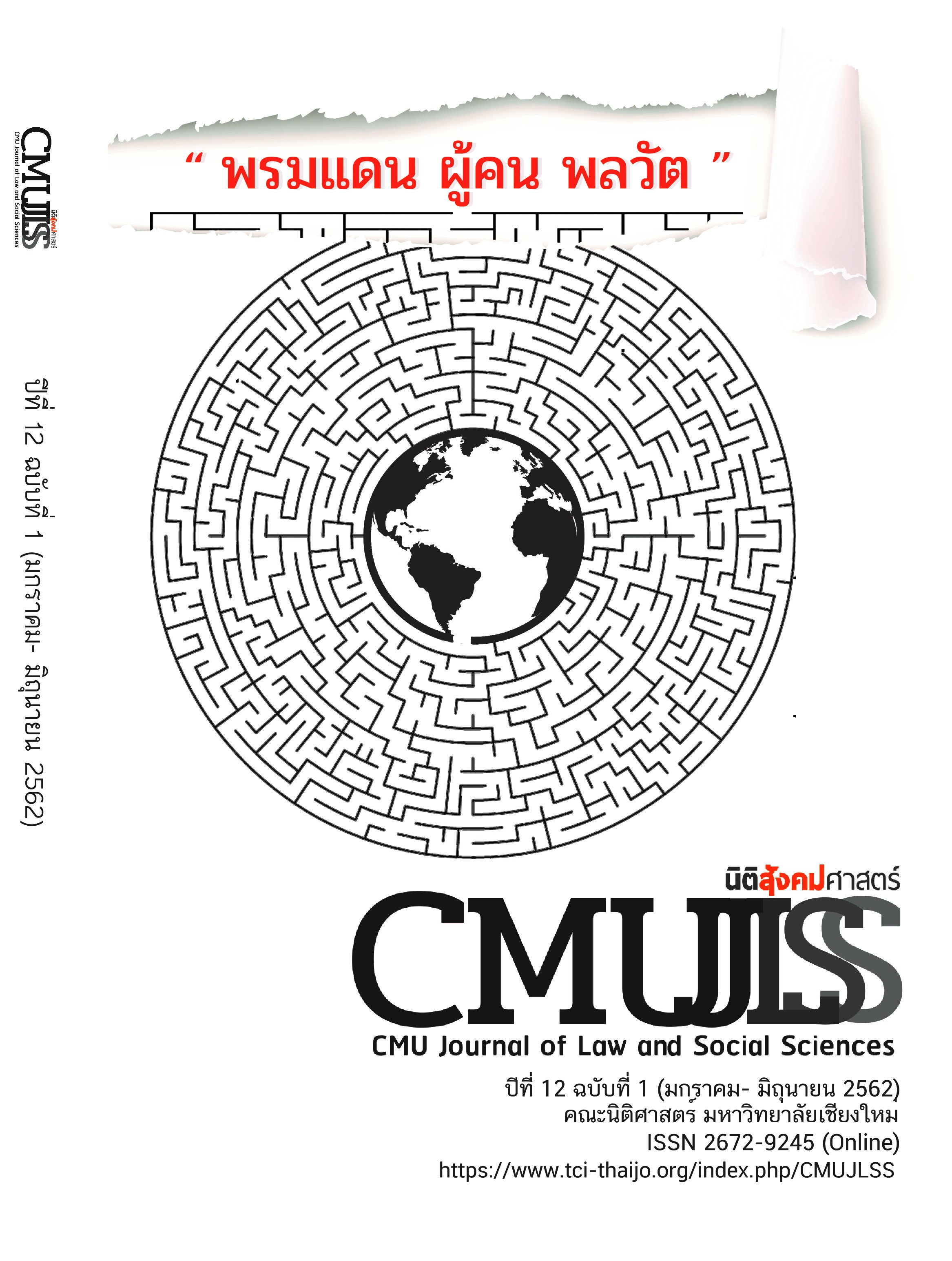หลักอธิปไตยเหนือดินแดนที่ไม่สอดคล้องในยุคแอนโทรโปซีน
Main Article Content
บทคัดย่อ
หลักอธิปไตยเหนือดินแดนสามารถสืบค้นไปถึงที่มาในสนธิสัญญาเวสต์ฟาเลีย ค.ศ. 1648 และเป็นหลักการที่สำคัญในกฎหมายสิ่งแวดล้อมระหว่างประเทศโดยธรรมเนียมปฏิบัตินั้น หลักการดังกล่าวนี้ให้สิทธิอธิปไตยแก่ประเทศหรือรัฐต่างๆ ในการแสวงหาประโยชน์และใช้ประโยชน์จากฐานทรัพยากรโลกภายใต้เขตอำนาจของตน แต่ก็มีการโต้แย้งว่ารัฐหรือประเทศต่างๆ ได้อาศัยอำนาจเด็ดขาดจากหลักการนี้ไปปฏิบัติกับทรัพยากรชาติและสิ่งแวดล้อมของตนอย่างไม่ถูกต้องสมควรหรือแม้แต่เพิกเฉยต่อความรับผิดชอบร่วมกันต่อปัญหาสิ่งแวดล้อมโลก
งานวิจัยเชิงเอกสารชิ้นนี้นำเสนอข้อจำกัดของหลักการดังกล่าวที่ไม่สอดคล้องต่อยุคสมัยใหม่ทางธรณีวิทยา (แอนโทรโปซีน) ซึ่งเป็นยุคที่มนุษย์และกิจกรรมต่างๆ (วัฒนธรรม กฎเกณฑ์) ของมนุษย์มีผลกระทบต่อการเปลี่ยนแปลงของระบบนิเวศโลกโดยเฉพาะอย่างยิ่งกิจกรรมของรัฐในฐานะบุคคลหนึ่งในสังคมโลกที่มีอิทธิพลและส่งผลกระทบมากที่สุด ด้วยเหตุนี้รัฐไม่อาจอาศัยข้อจำกัดทางกฎหมายระหว่างประเทศเพื่อปฏิเสธความรับผิดชอบร่วมกันต่อการปกป้องสิ่งแวดล้อมโลกได้ซึ่งงานวิจัยนี้ริเริ่มนำเสนอหลักการ State Trusteeship และแนวคิดระบบกฎหมายสิ่งแวดล้อมข้ามพรมแดน
Article Details
O ความคิดเห็นใดๆ ที่ลงตีพิมพ์ใน CMU Journal of Law and Social Sciences เป็นของผู้เขียน (ความคิดเห็นใดๆ ของผู้เขียน กองบรรณาธิการ CMU Journal of Law and Social Sciences ไม่จำเป็นต้องเห็นด้วย)
O กองบรรณาธิการ CMU Journal of Law and Social Sciences ไม่สงวนสิทธิ์ในการคัดลอกแต่ให้อ้างอิงแหล่งที่มาด้วย
เอกสารอ้างอิง
Bosselmann Klaus. Earth Governance: Trusteeship of the Global Commons. Cheltenham: Edward Elgar Publishing. 2015.
Christian Marxsen. “Territorial Integrity in International Law-Its Concept and Implications for Crimea.” ZaoRV, 75 (2015): 7-26.
Cohen J. Jean. Globalization and Sovereignty: Rethinking legality, legitimacy and Constitutionalism. Cambridge: Cambridge University Press. 2012.
Craig, G. Donna, Robinson A. Nicholas, and Koh Kheng-Lian. Chapter 20. Vol. II, Capacity Building for Environmental Law in the Asian and Pacific Region: Approaches and Resources. Manila: Asian Development Bank. 2002.
Dunne, Tim, Kurki Milja, and Smith Steve. ทฤษฎีความสัมพันธ์ระหว่างประเทศสาขาวิชาและความแตกต่างหลากหลาย [International relations theories : discipline and diversity]. Translated by Jittipat Poonkham. 1 ed. Bangkok: Siam, 2017. (in Thai)
Ernst-Detlef Schulze. “Uncertainties of Global Biogeochemical Predictions.” In Global Biogeochemical cycles in the climate system, edited by Ernst-Detlef Schulze, Martin Heimann, Sandy Harrison, and David Schimel, et al., 3-14. Massachusetts: Academic Press, 2001.
Fisher D.E. Legal Reasoning in Environmental Law. Cheltenham: Edward Elgar. 2013.
Gillespie Alexander, “Implementation and Compliance Concerns in International Law: The State of the Art within Three International Regimes,” NZJ Envtl.L,7 (2003): 53.
Jóhannsdóttir, Aðalheiður. “The significance of default: A study in environmental law methodology with emphasis on ecological sustainability and international biodiversity law.” PhD diss., Uppsala University, 2009.
Kanongnij Sribuaiam. “ความยุติธรรมสิ่งแวดล้อม” [Environmental Justice]. Bangkok: Institute of Public Policy Studies, Foundation for the Promotion of Public Policy Studies, 2017. (in Thai)
Kasperson J.X. and Kaspenson R.E. “Border Crossings.” In The Social Contours of Risk: Volume II, Risk Analysis, Corporation & the Globalization of Risk, edited by Kasperson J.X. and Kaspenson R.E, 217-248. London: Earthscan, 2005.
Kuokkanen Tuomas. International Law and the Environment: Variations on a Theme. Alphen aan den Rijn: Kluwer Law International. 2002.
Mason Michael. The New Accountability: Environmental Responsibility across Borders. London: Earthscan. 2005.
McCaffrey S.C. The Law of International Watercourses: Non-navigational Uses. Oxford: Oxford University Press. 2001.
Miller David and Hashmi H. Sohail. Boundaries and Justice: Diverse Ethical Perspectives. New Jersey: Princeton University Press. 2001.
Oppenheim Lassa. International Law: A Treaties, 3th ed. Ronald F. Roxburgh. Clark, New Jersey: The Lawbook Exchange, Ltd. 2005.
Philpott D. Z. “Ideas and the Evolution of Sovereignty.” In State Sovereignty, edited by Sohail H. Hashmi, 18-19. Pennsylvania: the Pennsylvania State University Press, 1997.
Rechkemmer Andreas. Postmodern Global Governance. Baden: Nomos. 2004.
Robert V. Percival. “International responsibility and liability for environmental harm.” In Handbook of International Environmental Law Routledge, edited by Shawkat Alam, Jahid Hossain Bhuiyan, Tareq Chowdhury and Erika J. Techera, 681-695. London: Routledge. (2013).
Rockström Johan and Wijkman Anders. Bankrupting Nature: Denying Our Planetary Boundaries. Abingdon: Routledge. 2012.
Rockström, Johan, Will Steffen, Kevin Noone, et al. "Planetary Boundaries: Exploring the Safe Operating Space for Humanity," Ecological and Society, 14 (2009): 2.
Sand H. Peter. "Sovereignty Bounded: Public Trusteeship for Common Pool Resources," Global Environmental Politics 4:1 (2004): 47-71.
Taylor Pure. An Ecological Approach to International Law. Abingdon: Routledge. 1998.
Waikavee Thiti. “The Ecological Covenant Approach to International Biodiversity Regimes: Transformative Aspects of Global Governance for Sustainability.” PhD in Law diss., University of Auckland. 2015.
Walker Brian and David Salt. Resilience Thinking: Sustaining Ecosystems and People. In a Change World. Washington, D.C: Island Press. 2006.
William K. M., Thomas J. B., et al. “Defining and Unraveling Biocomplexity,” BioScinece, 51 Issue 12 (2001):1018-1023.
Zalasiewicz, Jan, Mark Williams, Will Steffen, Paul Crutzen, “The New World of the Anthropocene,” Environmental Science & Technology, 7, 44 (2010): 2228–2231.

